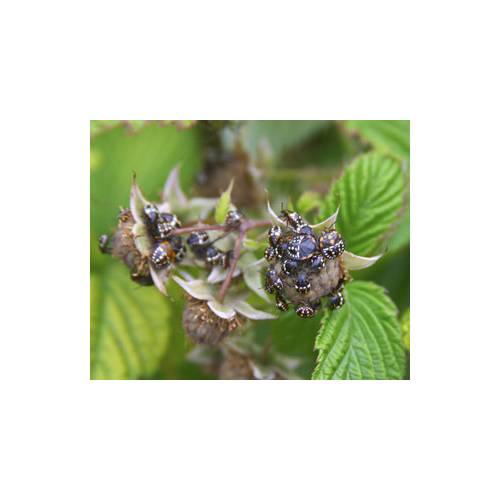
Parasites and insects
Shield bugs
- Details
-
Ouch, you have just picked that lovely raspberry that was so tempting...and horror of horrors! It has the disgusting taste of the shield bug! These stinging insects proliferate on numerous plants but luckily, they are not very tenacious.
The symptoms
The presence of shield bugs is indicated by several symptoms. The most obvious is the bad taste they transfer to the fruits that they bite. Apart from this phenomenon, the bite of the shield bug causes a deformation of the leaves but it is not very visible. On the other hand, these insects like to stick together in groups made up of both adults and young individuals, sometimes numbering several dozen individuals. They flee as soon as you get near. Regardless of the exact species of shield bug, the damage is never very great. However as always there exists an exception: the cabbage bug that causes real damage.
Lifecycle
Most shield bugs pass winter in their adult state, hidden under cover. They lay their eggs early in the spring on the underside of the leaves of the plants that they will later call home. The very young shield bugs (the larvae) are very mobile and begin biting the plant to steal its sap. The young insects develop very quickly and reach the adult stage by early summer. They are frequently found on numerous plants near woods and forests.
How to fight them
It is not necessary to combat the shield bugs unless they infest plants that we eat and give them a bad taste, such as raspberries and lettuces for example, also the cabbage if they attack it. A spraying with a contact insecticide (containing pyrethrum) will reduce their numbers but this treatment is not advisable for plants that are to be consumed. Plants can also be protected by using very fine netting, which will prevent the insects going on them.
How to avoid them
Shield bugs move around very easily and it is difficult to prevent them landing on a plant. However, a good tip is to spray the leaves and lower stems of a plant with a solution of soluble sulphur. Even if this is not very effective, this inoffensive treatment does repulse a good number of the shield bugs who refuse to climb on the plant afterwards.
Good to know
There exist shield bugs that are actually useful in the garden: the predatory shield bugs. They are very mobile and hunt other insects that they kill one after the other. These insects are not easy to spot because they move around very quickly. If they are captured, they defend themselves by stinging. The gardener will get away with a small mark but at least he will know that his garden is well protected by these allies! - Photos (1)

